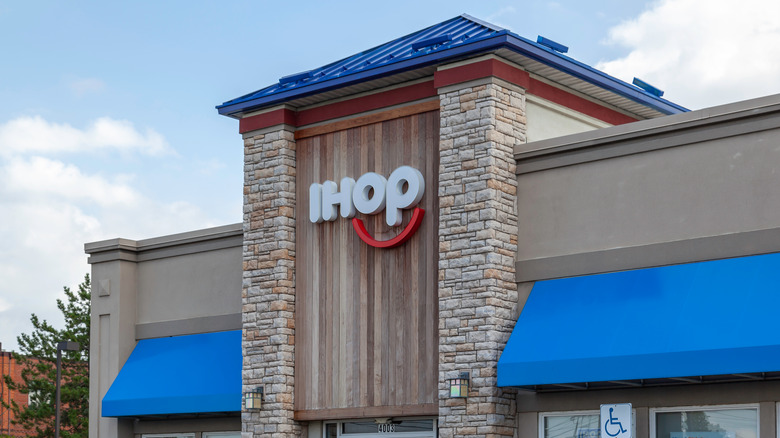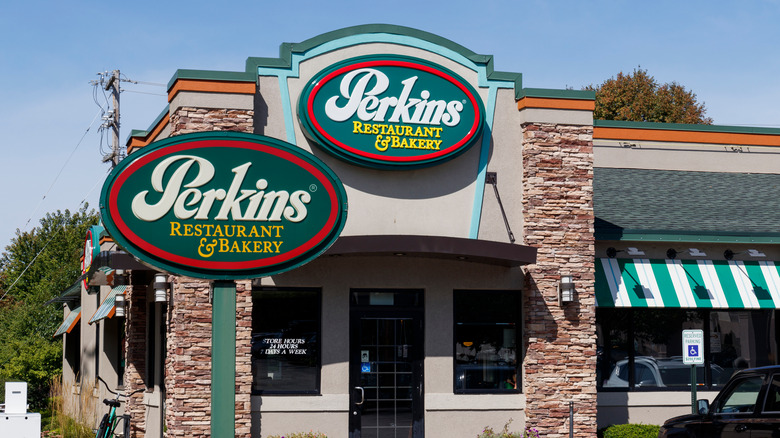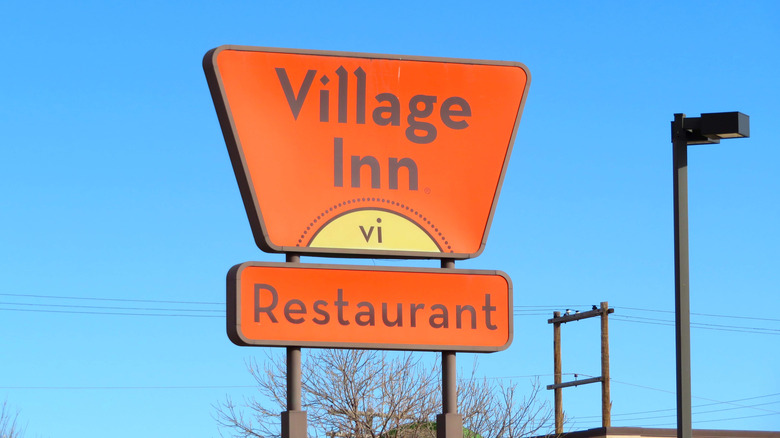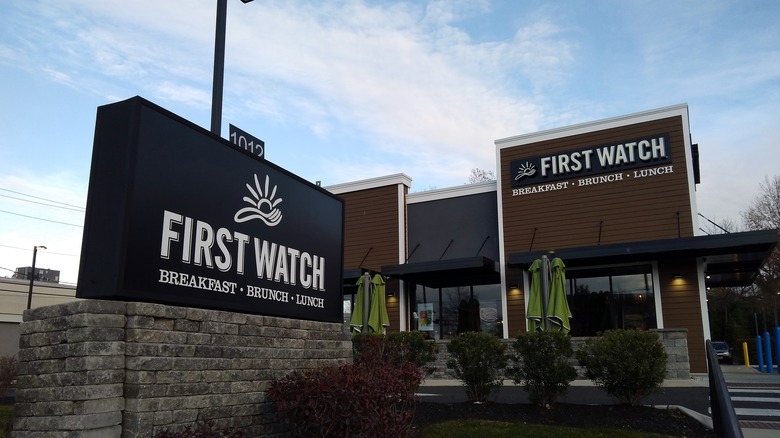Chain Breakfast Restaurants That Are Disappearing Across The Country
You've likely heard it before that breakfast is the most important meal of the day. The morning meal helps you kickstart your day and helps you lose weight. From oatmeal to avocado toast, breakfast is a meal that stands apart from the rest, as it can be savory or sweet. And when it comes to the formula of chain restaurants, making a breakfast concept is pretty cut and dry.
One quintessentially American characteristic is the country's love of chain restaurants. You can eat at a location in Washington, Florida, and Maine, and the menu, prices, and flavors will (almost) always be the same. While chains tend to have cuisine concepts like Italian or Asian-fushion, breakfast restaurants share a lot of similarities. You can't have a breakfast chain without omelettes, pancakes, and piping hot coffee, among other things. The comfort of breakfast as a meal and chain restaurants, in general, make for a familiar and reassuring experience whether you're in your town or hundreds of miles away.
However, as we know by now, the COVID-19 pandemic has had a detrimental impact on restaurants. The Real Deal reported that 14% of all restaurants closed permanently due to impacts from the pandemic. And, unfortunately for chain restaurant enthusiasts, some beloved chains are nearing extinction, particularly those with similar breakfast concepts. We decided to round up a few chain breakfast restaurants that are disappearing across the U.S., so you know you're not crazy when you start noticing these chain locations dwindling before your eyes.
IHOP
The International House of Pancakes, known to most as IHOP, has been a staple for pancake stacks for what feels like forever. Whether you're looking for a replenishing brunch or a late-night stack, IHOP's creative pancake offerings always hit the spot. However, back in October 2020, IHOP announced its plans to close nearly 100 locations across the U.S. (via Restaurant Business). One of the company's franchisees owned 49 IHOP restaurants prior to 2020, when they had to file for bankruptcy (via FSR magazine). The move came after the company saw sales dwindle by almost 30% in the first half of 2020, with its parent company, Dine Brands, reporting a net income decline of 58.2%, while overall revenue was down 18.7%, hurting the brand (per Restaurant Business).
IHOP isn't going down without a fight, though. The company plans to hire 10,000 workers to keep up with an increase in demand, while the U.S. collectively grapples with a labor shortage (via Reuters). And the company is still moving forward with its fast-casual restaurant concept, Flip'd, basically a mini IHOP with fast service, first announced in late 2019. According to IHOP CEO Jay Johns, "Since we originally announced flip'd in 2019, a lot has changed. We wanted to ensure that we were evolving the concept to meet our guests' needs," he said, via an official IHOP media release. "With flip'd, we can provide that on-the-go fast casual experience, making now the perfect time to bring this concept into the world."
Perkins
We all have those mornings where only a big plate of greasy breakfast will do. And those of us lucky to live near a Perkins Restaurant and Bakery know that it's the best place to get a hearty plate of eggs, bacon, and all the fixins', along with a Mammoth Muffin to bring home for later. However, you're not imagining things if suddenly you're finding it difficult to track down a Perkins near you. Back in 2019, Perkins & Marie Callender's, LLC, filed for Chapter 11 bankruptcy protection after closing more than two dozen locations in states like Florida, Wisconsin, Kansas, and Minnesota (via Nation's Restaurant News). It wasn't the first time either — the company first filed for bankruptcy back in 2011. Both of these instances were compacted by the decline in sales in casual-dining industries, the increase in labor costs, and a tight labor market — and this was all prior to the COVID-19 pandemic, which only exacerbated all of those issues (via USA Today).
The company currently has about 320 or so restaurants, which is down from 2018, where the company operated 381 Perkins locations (via USA Today). The Perkins website shows that some major markets only have a handful of restaurants, with states like Minnesota and Florida retaining the most locations. However, a state like Washington only has two remaining restaurants.
Village Inn
The 1950s was a decade of firsts in the food industry, with many modern-day chains opening during that time. One of those on the list is the Village Inn, an all-day breakfast restaurant that got its start in Denver, Colorado. While its signature orange sign is a familiar sight around the Rocky Mountain region and a few other states like Florida and Arizona, the restaurants have been quietly disappearing across the U.S. Particularly, states like Colorado and Utah have seen a significant decline in recent years (via The Denver Post).
According to Village Inn's website, the company has just over 120 locations listed nationwide, after recently boasting more than 200 locations. The bulk of locations are in Colorado, Florida, and Nebraska, but there are typically fewer than 10 per every state in which the company operates. Since the end of 2019, 61 locations of the chain have closed, with 34 becoming franchises, while the remaining were permanently shuttered (via FSR magazine). The company reported declining sales and margins since 2017, and it can be expected that, as with most U.S. restaurants, they suffered more during the pandemic.
First Watch
First Watch has found a way to market the stereotypical brunch experience and turn it into a recognizable brand. The chain restaurant serves up a wide variety of menu items, including seasonal pancake specials and avocado toast, as well as a juice bar. Prior to the pandemic, in 2019, First Watch had its "best year on record," according to CEO Chris Tomasso (via Restaurant Dive). However, the COVID-19 pandemic slowed things down exponentially. The chain closed down all locations temporarily during the pandemic, and there have been reports of locations closing around the country (via WKRC Local12). One closing includes a location in Kansas City, Kansas, that had been open for 30 years (via The Kansas City Star).
While First Watch spots may be few and far between, the company is trying to recoup losses from the pandemic by expanding. They've returned to restaurant projects put on pause during the pandemic to open new locations. And, to maximize on fans of boozy brunch, they've begun serving alcohol. According to Tomasso, the company had expected at least half of its restaurants to be able to serve alcohol by the end of 2020 (via Restaurant Dive). Additionally, to combat staffing issues and limited restaurant capacity, the company features wait time technology, so patrons can better plan their visits to avoid long waits.




